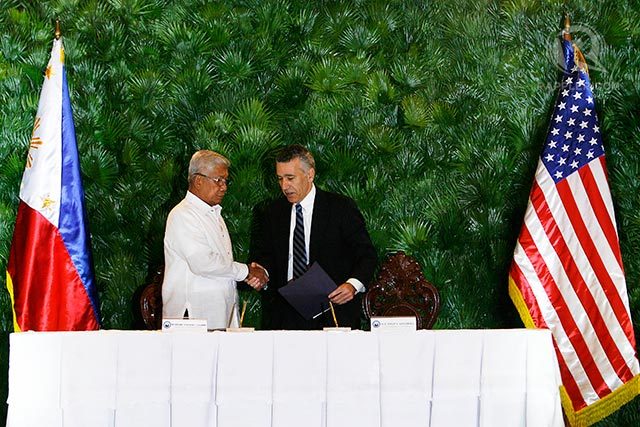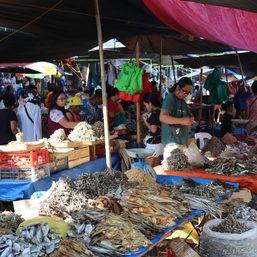SUMMARY
This is AI generated summarization, which may have errors. For context, always refer to the full article.

MANILA, Philippines – Malacañang is ready to defend the legality of the Enhanced Defense Cooperation Agreement (EDCA), in the event it is challenged in court.
Presidential Spokesperson Edwin Lacierda made the statement on Wednesday, April 30, as critics question the constitutionality of the EDCA.
“We believe in certain principles outlining, governing the Enhanced Defense Cooperation Agreement. And if there are some people who would choose to avail of judicial processes to question the Constitutionality, the government is prepared to defend the EDCA,” he said.
He also shot back at critics who said the Philippines is not getting anything in return from the EDCA, after US President Barack Obama did not give a categorical commitment to defend the Philippines if it were attacked by China.
“We believe that this Enhanced Defense Cooperation Agreement will not only benefit them, but will also benefit us in terms of enhancing our military capabilities, improving our training, sharing of resources, for instance. What is important for instance is inter-operability and also capacity building and that’s what we’re doing,” Lacierda said.
He also cited “the modernization of our military hardware” and the “humanitarian assistance on disaster response” as other benefits of EDCA.
Addressing what others viewed as Obama’s noncommittal response, the Palace said it had faith in Obama’s promise to honor the two countries’ alliance, adding “they have given their word.”
“We have treaties on hand to invoke should the case arise. We have this Enhanced Defense Cooperation Agreement that we just recently signed. Plus the fact that President Obama said ‘the commitment of the United States to the Philippines is ironclad.’ There can be no greater assurance on that,” he said.
The EDCA was signed by both countries just hours before Obama arrived on Monday, April 28, for a two-day state visit to the Philippines, his first. As expected, EDCA became the focus of the trip, with discussions centering around security and defense.
Lawmakers, both former and current, have decried the lack of transparency in the EDCA negotiations, as copies were made public only a day after the signing. They have also questioned the deal signed without Senate approval.
US assurance
Considered a major accomplishment of Obama’s 4-nation Asian trip that also brought him to Japan, South Korea and Malaysia, the agreement gives US troops greater access to Philippine military bases, and allows them to construct facilities and store equipment there, with the consent of Philippine officials.
Malacañang and the United States insist EDCA is only building on past treaties between the US and the Philippines that have already been ratified by the Senate, and thus does not need Senate approval.
Interviewed on ANC’s Headstart on Wednesday, US Ambassador to the Philippines Philip Goldberg gave assurances nothing will be done without the Philippines’ approval.
“What happens now is once the agreement is in force, that we will discuss through the mechanisms that have been set up over the years for the [Mutual Defense Treaty], where possible locations will be, where military construction will take place, where you would want to widen apron in an airport, dredge ports that will benefit the Philippines as well.”
“Everything that will be done at every stage along the way will be discussed, will be mutually agreed, will be in the interest of the Philippines and the United States,”he said.
Asked about the legality of the document, Goldberg said: I think it’s legal, certainly from our side. But I’m not a legal expert on the Philippine side, you have to ask somebody here.”
During Obama’s visit, the world leader emphasized no new U.S. bases would be built in the Philippines, nor would any old bases be reopened.
He called the EDCA “a terrific opportunity” for the Philippines and the US to ensure “our navies, our air force are coordinated; to make sure that there is information-sharing; to allow us to respond to new threats and to work with other countries – ASEAN countries, Australia, Japan.” – Rappler.com
Add a comment
How does this make you feel?
![[ANALYSIS] A new advocacy in race to financial literacy](https://www.rappler.com/tachyon/2024/04/advocacy-race-financial-literacy-April-19-2024.jpg?resize=257%2C257&crop_strategy=attention)


![[In This Economy] Can the PH become an upper-middle income country within this lifetime?](https://www.rappler.com/tachyon/2024/04/tl-ph-upper-income-country-04052024.jpg?resize=257%2C257&crop=295px%2C0px%2C720px%2C720px)

There are no comments yet. Add your comment to start the conversation.